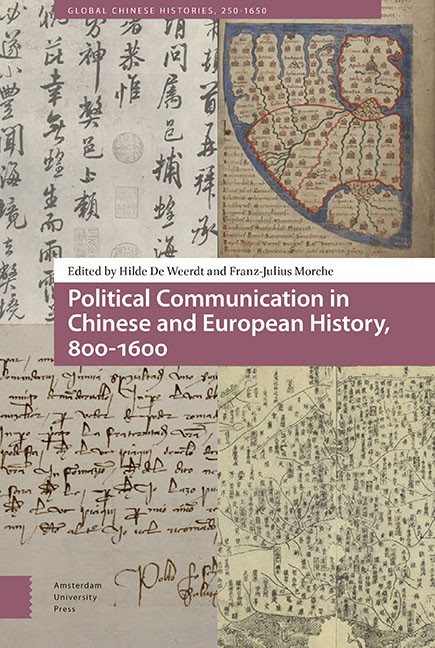Book contents
- Frontmatter
- Dedication
- Contents
- List of Figures and Tables by Chapter
- Acknowledgments
- Introduction
- Part I Communication and the Formation of Polities
- Part II Letters and Political Languages
- Part III Communication and Political Authority
- Part IV Memory and Political Imaginaries
- Epilogues
- List of Contributors
- Index
2 - Thoughts on the Problem of Historical Comparison between Europe and China
Published online by Cambridge University Press: 17 June 2021
- Frontmatter
- Dedication
- Contents
- List of Figures and Tables by Chapter
- Acknowledgments
- Introduction
- Part I Communication and the Formation of Polities
- Part II Letters and Political Languages
- Part III Communication and Political Authority
- Part IV Memory and Political Imaginaries
- Epilogues
- List of Contributors
- Index
Summary
It is a pleasant task to comment on a volume of such rich, and richly varied, research in comparative history. I have learned much in reading the volume's offerings, both about my own field and about several fields in which I have no expertise. What I will offer here is no more than rumination on a selection of the volume's articles — those that undertake specific comparisons between China, which is my own area of specialization, and Europe, which is not. I offer thoughts on how these articles do comparative history, and what one may learn about how to do comparative history from them; but thoughts also about what comparative history might be for: what answers the articles’ authors seem to give to that question, and what possible other answers they seem less inclined to give. I should say at the outset that I find each of these articles a highly successful piece of comparative-historical work, and that insofar as I may talk about what they do not do, it is not to find fault but to explore what possibilities comparative history might offer.
The articles vary, obviously, widely in topic; but to my eye they share much in method, in logic of argument, and in presentation — even to some degree in form. In their exemplary article ‘The Printers’ Networks of Chen Qi (1186–1256) and Robert Estienne (1503-1559): a micro-comparative approach to political dependence and censorship’, Chu Ming Kin and Julius Morche remark on their own procedure: ‘While there is ample historiographic precedent for comparing Song China to the European Renaissance, the direct juxtaposition of microhistories might seem an unusual analytical approach’ (p. 384; emphasis mine). In fact in these articles the approach is not unusual: both ‘microhistories’, or something like them, and ‘direct juxtaposition’ of the resulting narratives recur almost throughout. Technically, as the term ‘microhistory’ usually tends to be applied to work that focuses closely on a single individual or small group, the only other strictly ‘microhistorical’ chapters alongside Chu and Morche's may be those of Bernard Gowers and Lik Hang Tsui on Yue Fei and Thomas Becket, and of Ari Levine on the historiographies of Ye Mengde and Niketas Choniates. Gowers and Tsui call what they are doing not ‘microhistory’ but ‘micro-comparison’ (p. 482), yet clearly affiliate themselves with ‘microhistory’ through their invocation of Carlo Ginzburg (p. 482).
- Type
- Chapter
- Information
- Publisher: Amsterdam University PressPrint publication year: 2021



